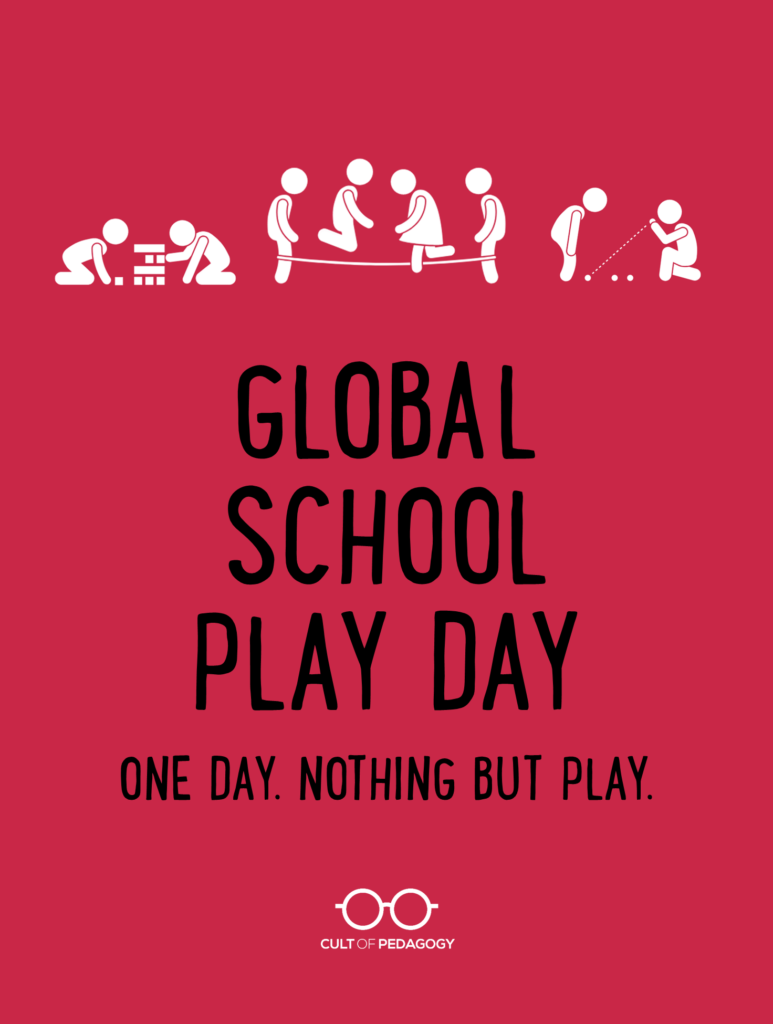
Listen to my interview with Eric Saibel, Scott Bedley,
and Tim Bedley (transcript):
Sponsored by Listenwise and Pear Deck
In the past, when I heard people say things like “Kids need to play more,” I always agreed, but in kind of a lukewarm way. I was aware that school recesses had been shrinking over the years, and I’d read the stories about how kids in other countries like Finland and Japan play a lot more than kids do in the U.S. On top of that, the time allotted to courses like art, music, and physical education has been dramatically cut to make more room for reading, math, and computer-driven test prep, so kids in general are spending less time moving, less time being creative, and more time preparing for tests. I knew it was a topic worth looking at, but I never got too fired up about it.
I should have, because my own awareness of our problem with play has certainly increased. I’ve watched my own three children grow from small kids who could spend hours toddling around a playroom finding endless ways to entertain themselves into pre-teens who can lose half a day staring at tiny screens. And I’ve seen what happens when we take those screens away, when we tell them to take a couple hours off and do something else, how they flounder around, clueless, completely incapable of coming up with their own fun.
Until about a week ago, that was the extent of my thinking about the problem, a prolonged shrug as I told myself that my husband and I really needed to do better at getting our kids away from their screens so they could wake up those other areas of their brains.
But then I watched this TED talk called “The Decline of Play,” given by a psychology professor named Peter Gray. It had a profound impact on my awareness of how serious this problem really is.
If you can make the time, I’d recommend you watch it. In the talk, Gray details how over the decades, we have gradually taken more and more play away from kids and replaced it with structured activities, academic work, and digital experiences to the point where they hardly ever “play” at all. As this trend has continued, we’ve seen a rise in childhood anxiety, childhood suicide, and a growing number of kids who simply don’t know how to play.
It got me thinking about the emphasis some schools place on bell-to-bell teaching, on making sure our students are never idle, and how this push is doing more harm than good. It got me thinking about how kids in our town can’t explore new sports once they’re past the age of about 8, because at that point they’re “too old” and the other kids have already been seriously at it for years. It got me thinking about how many teachers tell me that every year, they see more and more students with severe emotional issues and how badly they need training on trauma-informed teaching. It also got me thinking about the terrifying rise in school shootings in the U.S., and how we are all desperately looking for answers to why they keep happening.
I now feel a deep sense of urgency about Dr. Gray’s appeal to teachers, parents, and community members to make play a priority again. Three California educators who also heard the talk—Eric Saibel, Scott Bedley, and Tim Bedley—responded to that call in 2015. Along with a group of other educators, they launched Global School Play Day, a full day in February set aside to just let students play. All day long. Now in its fifth year, Global School Play Day has spread across the world. Although one day out of the year isn’t nearly enough, they are hoping that the day will inspire schools to build more time for unstructured play into every school day.

(L to R) Tim Bedley, Eric Saibel, Scott Bedley
What is Global School Play Day?
Started in 2015, Global School Play Day is one day set aside for students to do nothing but play all day. On their website, GSPD organizers urge teachers to follow three simple guidelines:
- No Screens: Students are encouraged to bring toys, but electronic toys or any devices with screens should be avoided.
- No Structure: Adults should not attempt to organize or structure student play in any way.
- Stay Out of the Way: Adults should let students manage their own play and should not interfere except in situations where someone could get hurt or fired.
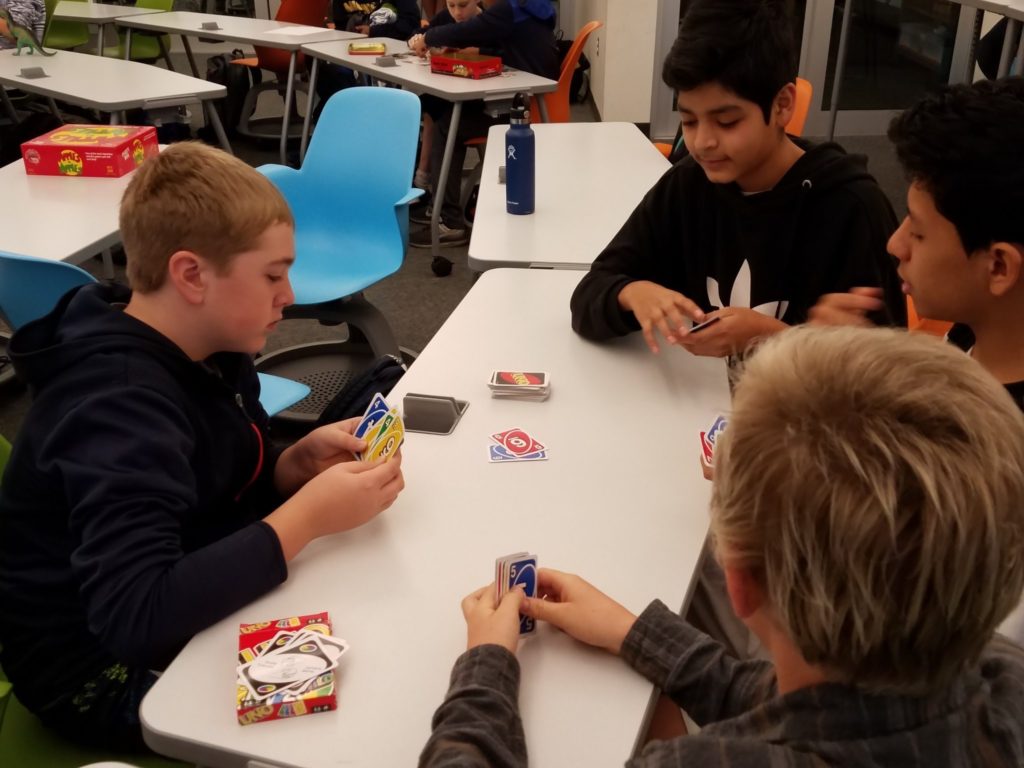
Does it Have to be a Whole Day?
Schools can choose to set aside whatever amount of time they want, but GSPD organizers encourage a full day because it takes more time for kids to sink into the lack of structure.
Tim Bedley explains: “When we were kids, how often did we go to our parents and say, I’m bored, Right? We would complain about being bored. I never have my youngest son come up to me and say he’s bored, because he’s got a phone. And so kids never have the opportunity or the experience or the challenge of becoming un-bored. And really, if you only do it for an hour, you won’t experience that.
“I remember our second year of doing Global School Play Day, I had this little girl that talked to me and said, Mr. Bedley, this is boring, I don’t know what to do. And I’m like, Well, this day is for you then, because you need to learn how to get un-bored. She’s surrounded by kids with playground equipment and all these board games and all this stuff, and she doesn’t know what to do. That’s this generation of kids. We need to do this for them.”
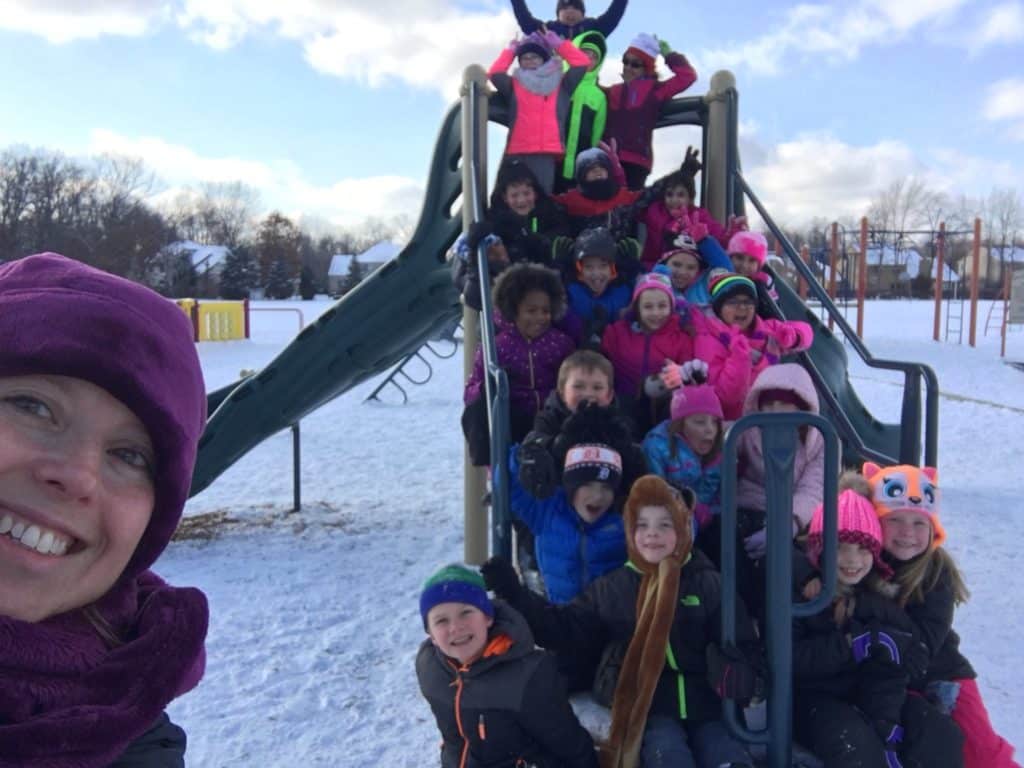
Is it Just for Elementary Schools?
Definitely not. Schools at every grade level are encouraged to participate.
“We’ve seen everything from TKs of course, all the way up to Brown University classes signing up to participate in this,” says Scott Bedley. While a large number of elementary schools sign up, he says, “there’s an incredible benefit for middle and high school students. The socialization that’s happening at the high school, it’s really important between peer groups. The relationship building that happens across those peer groups where they might be separated normally when they’re in a class and they can kind of let those boundaries go is a powerful piece of it as well.”
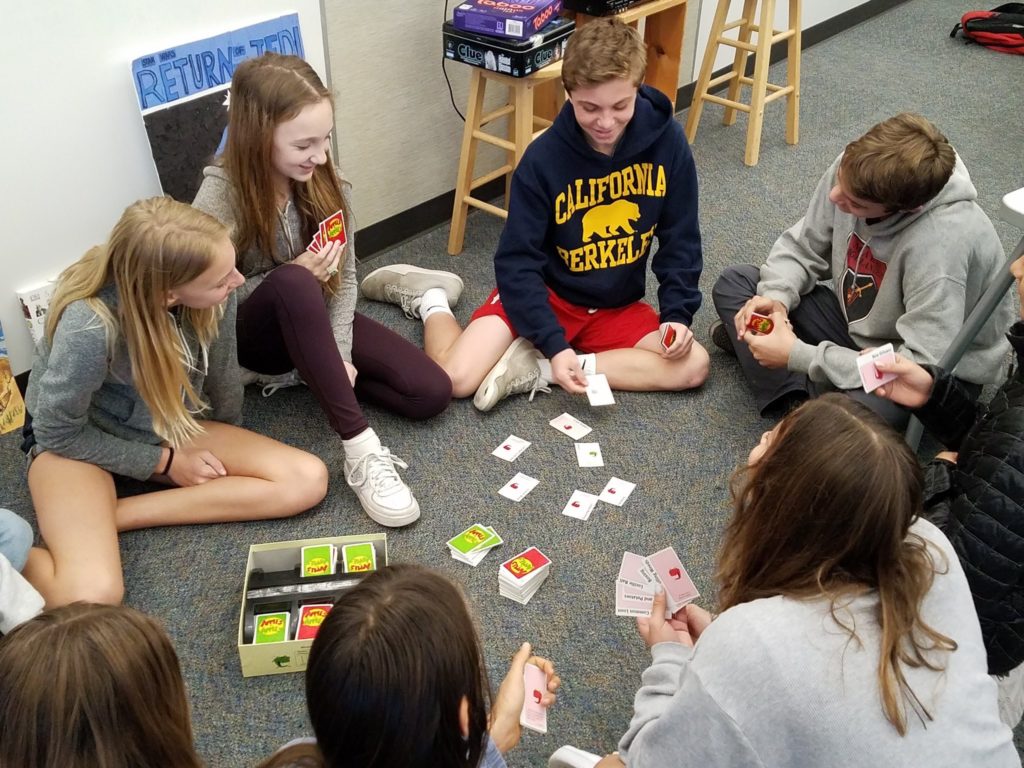
How Can Schools Participate?
There are no fees or requirements associated with participating in GSPD: Schools who want to participate can just do it on the first Wednesday of February. Prior to the actual day, schools are encouraged to educate students and parents about the day and collect toys and games ahead of time.
To help the movement grow, organizers also ask participating schools to sign up through their website–globalschoolplayday.com—so that other schools can connect with them and see how many schools are participating.
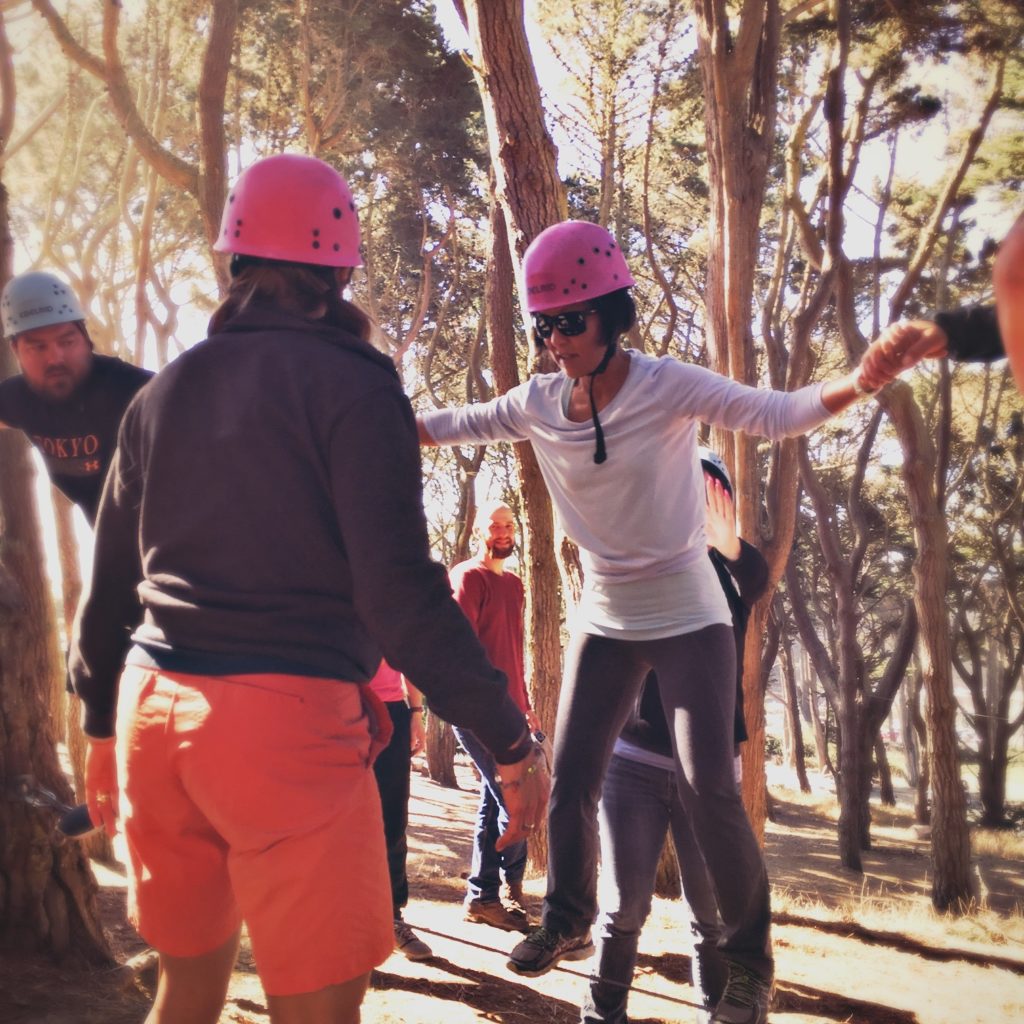
Inspired by GSPD, principal Eric Saibel takes his staff out for a full day of play on a ropes course in San Francisco. “The deeper positive effects that play has are not just beneficial for kids, but also for us grownups, too.”
Organizations Working to Improve Play for Kids
Here are two other organizations that share the same mission as GSPD and are worth looking into.
Pogo Park rebuilds and revitalizes communities by focusing on their public park spaces. “And it’s not just a question of putting up a new play structure,” explains Saibel. “It’s about staffing the parks with community members to run programs for children, programs for adults, to bring together the community for different special events, to work with the city to create safe throughways for bicyclists and pedestrians, to work with the city to buy up neighboring houses that were drug houses. It’s about a holistic approach to community transformation that makes it safe for everybody, and then the educational and the life outcomes only improve after that.”
Changing the Game Project works to “return youth sports to our children,” to bring about a cultural change in youth sports. “As an athlete myself,” Saibel says, “as a youth sports coach, I know just as so many of us know that the culture around youth sports has become hyper competitive and very toxic, and the effects on kids are really tragic, because about 70 percent of children at the age of 13 walk away from competitive sports. Participating in sports is not about, Oh, one day I’m going to be a professional. It’s about the joy of having a team, about competing, about challenging ourselves, the physical health, the sense of confidence and overall well-being that that can bring about, regardless of how good we are.”
Stay Connected
On Twitter, follow Global School Play Day at @GSPlayDay and find more great photos and posts about the day through the hashtags #GSPD2017, #GSPD2018, and #GSPD2019. You can find Eric Saibel at @ecsaibel, Scott Bedley at @scotteach, and Tim Bedley at @tbed63.
Join our mailing list and get weekly tips, tools, and inspiration that will make your teaching more effective and fun. You’ll get access to our members-only library of free downloads, including 20 Ways to Cut Your Grading Time in Half, the e-booklet that has helped thousands of teachers save time on grading. Over 50,000 teachers have already joined—come on in.



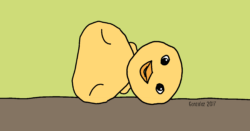

I love this idea of embracing the importance of play in our learning and as a stand alone activity for kids. I think there are so many great points brought up in this article as well as in the mentioned TED talk.
I am concerned though that this article, from someone I admire in education, refers to the learning that kids do in music, art and PE as the same as recess. Or that by cutting back on the time to be in these classes is the same as cutting back on free unstructured playtime. It implies that learning does not take place here, and that it is not equal to the learning that takes place in the traditional grade level classroom.
Now it feels funny to be arguing this, since I am a proponent of learning through play, and encourage experimentation and investigations to foster learning, which some may consider play. And because I support the importance of unstructured play time to allow students to be bored and to learn how to be “un-bored”. However this introduction unintentionally lessens the education and importance of the learning that takes place in these classes. I expected a different point of view from this site instead of more of the same kind of thinking that leads to the time for these subjects being cut. Perhaps if we did have more time for these classes, then students would be more practiced in problem solving and creative thinking that would allow for more free flow play, and vice versa.
“In the past, when I heard people say things like “Kids need to play more,” I always agreed, but in kind of a lukewarm way. I was aware that time in school for things like recess, art, music, and physical education was shrinking, and I’d read the stories about how kids in other countries like Finland and Japan play a lot more than kids in the U.S. do, so I knew it was a topic worth looking at, but I never got too fired up about it.”
Hey Michelle,
Thanks for taking the time to share your thoughts. I didn’t mean to lump these subject areas in with recess as if they are the same as unstructured play. I wanted to include them in the discussion because I believe they have also been a casualty of the drive to improve test scores, and although Dr. Gray didn’t go in that direction, I believe that loss has also contributed to the larger problem described in his TED Talk. I have revised my opening paragraph in hopes that it reflects this intention more clearly.
When I was in school there was no such things as mobile phone, laptops,or tablets, we didn’t feel disadvantaged, we’d go out in the morning play our games ( hopscotch, skipping, chasing, cowboys and Indians etc) we’d come home at dinner time after having a wonderful day.
Hi Jen,
I want to thank you for taking the time to think through and address the tough things coming at us from all angles in society these days. And, thank you for overcoming the fear to have a voice. We do certainly have a lot of work to do. On the heels of remembering and celebrating the work of Martin Lither King, Jr., it’s so hard to believe we are still fighting SO DAMN HARD for human rights in America.
Hey Kim,
Thanks so much for taking the time to lend your voice! I’ll make sure Jenn sees this — she’ll really appreciate it.
Thank you for this amazing post! My most recent teaching position was as a Kindergarten teacher, and my teammate and I were always wishing that there was more time in the day to let the students play. With the increased rigor of the standards and the focus on test scores, it is hard to “justify” free play. Now I am an instructional coach and a part of the school leadership team. The idea of an entire day of play is very appealing to me. I would love some research to bring to my administrator. Could you point me in the right direction?
Thank you for reigniting my passion for play!
Hi Ellie!
I’m glad that you found value in this post about Global School Play Day. To help with sharing this information with your administrator, I suggest sharing Peter Gray’s TED Talk linked in the post and you might also be interested in checking out this book: Serious Fun: How Guided Play Extends Children’s Learning.
I hope this helps!
Hi Ellie – try the “Muddy Hands” report, which includes a literature review as well as primary research… good luck!
https://outdoorclassroomday.org.uk/resource/muddy-hands-report/
Nick
I totally agree that our kids need rich moments in school to play and to interact with peers and the global play day is an excellent idea to provide it. I want to see this practice in my school.
I would love to expand my classes from the YMCA to school districts and co-ops.
That TED talk was absolutely fascinating. Gave me so much to think about. We started homeschooling partly because I could not handle the homework load of my elementary-aged kids (who struggle with anxiety), and while they now have quite a bit of unstructured time to pursue their own interests, I am trying to think of how I can ensure they have more play time with peers that is unsupervised by adults (or supervised very very loosely). We do enjoy park days with many families where moms chat and kids play or are shooed away form adult conversations. We let our kids play pretty unsupervised in the front yard which has led to getting to know some neighborhood kids. Sadly, there just aren’t many kids around, and most of them spend afternoons in sports or doing homework. If we move, this is definitely something I will consider in choosing a neighborhood.
I have been listening to this podcast since I started considering returning to school to get a Bachelors in Elementary Education. This podcast helped convince me that this was the right path. What caused me to finally comment was that this episode has inspired a research quest! I mentioned Dr. Gray and the Global School Play day episode to my amazing host teacher yesterday, and she knew exactly what I was talking about! Turns out she also listens to your podcast. She had high praises for Dr. Gray and started the year last year with an hour of play in her primary classroom. They also participated in Global Play Day. I’ve since discovered The Alliance for Self-Directed Education. If there isn’t already an episode that I haven’t found about this topic, would you consider doing one?
Hey Jill, We keep a running list of “Topics to Consider” for future podcast episodes. I will be happy to add The Alliance for Self-Directed Education to the list for Jenn to check out.
Thank you for bringing Dr. Gray’s Ted Talk and the conversation among you and your guests to us. I feel that my own children (30 and 27) were probably part of a generation that had the opportunity to play – they laughed, the disagreed, they cried, they got angry, the reconciled, they forgave and were forgiven. Now as adults , they do face the challenges of adult life .They know that nothing lasts forever. They understand the value of patience. They have learned to recover from the inevitable sadness that pertains to life and is responsible for the existence of happiness.
I wish we could play the pause button and have every single human watching Dr. Gray and listening to your conversation. As this is a unattainable dream, I will make sure all the young parents I know and come on my way will have access to these gems. Everyone can do the same :).
Global School Play Day really has new meaning for me after the isolation of virtual learning. Many students did not have the opportunity to work and play with friends during this time and the skills developed through these interactions have to be reengaged and developed. As we have returned to in person learning at school, I have noticed that the focus on social emotional and social skill development has been particularly important. Open ended play opportunities provide a chance for students to develop these skills in a natural environment. Providing this time for students to work together is so important but often overlooked. Global School Play Day is a great way to remind us all of the importance of play for our students growth and development.